With early federal elections scheduled for February 23, InfoMigrants takes a look at the election manifestos of Germany's top seven political parties in terms of migration. Today we look at what the Greens (formerly Green Party), are saying about migration.
For the upcoming German elections, InfoMigrants takes a closer look at where the top seven political parties stand on migration and asylum policy. Thus far, we have published a summary of the Conservatives (CDU/CSU) policy proposals, the Social Democrats (SPD) and the Alternative for Germany (AfD); we will be publishing overviews on the FDP, BSW and Left party within the next few weeks.
The Greens are traditionally regarded as a party of environmentalists and humanists, who try to pursue a pacifist agenda on all fronts. Considered a left-wing party, the Greens tend to attract the votes of urban elites, especially those with tertiary education and higher university degrees.
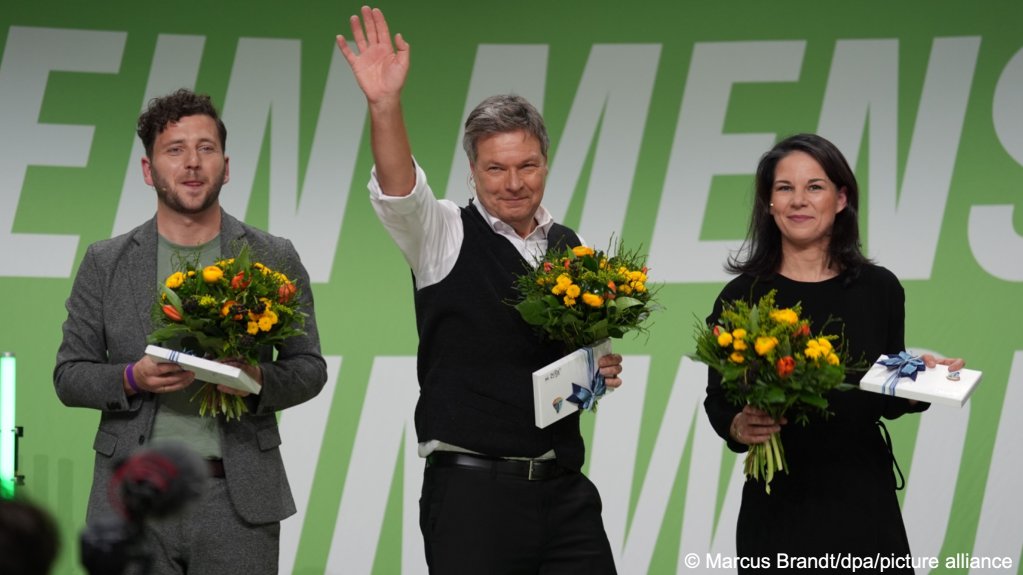
They are also considered to be potential kingmakers in elections, as they have formed coalitions with both the Conservatives and the Social Democrats repeatedly in regional governments in the past, and have had several federal-level coalition successes with the Social Democrats.
After the 2021 election, the Greens entered a three-way arrangement with the Social Democrats and with the business-friendly Free Liberals (FDP). This marriage of convenience, however, fell apart last November, resulting in elections being called seven months before they originally were due.
Whether or not the Greens will be able to join the next government as a minor coalition partner again this time around will depend on the outcome of the election and the ensuing negotiations. Currently, the party is projected to get around 14 percent of the vote.
It is unlikely, however, that either the Greens or the SPD will be given a mandate to build a new government; polls suggest that the Conservatives (CDU/CSU) will be in charge of leading the next government — a party with which the Greens have little in common, especially when it comes to migration.
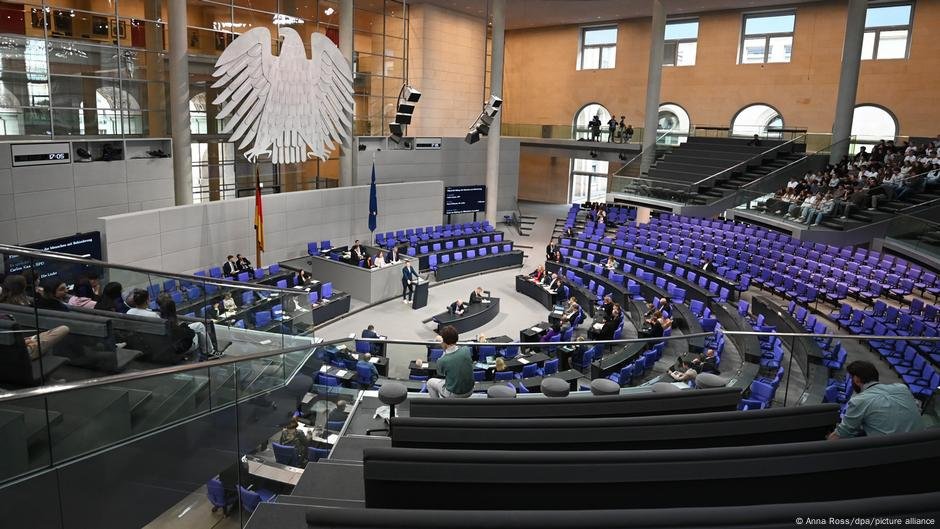
A 'green' policy outlook
The title of the Greens' manifesto is "Zusammen Wachsen," which can translate either as "to grow together" or "to intertwine." The double meaning of the phrase appears to be deliberate.
The document focuses on creating a better future and mentions many longterm goals reaching well beyond the next four years, especially in regard to environmental concerns.
The manifesto consists of three chapters, with the first chapter looking at both environmental and economic issues, the second chapter dealing with social issues and the third chapter examining broader foreign and domestic policy issues.
Notably, the manifesto does not even mention migration or asylum directly at all in its four-page pre-amble but rather talks about abstract notions like "the strength of our country comes from the fact that everyone belongs, regardless of origin," highlighting the party's core belief that Germany is a country of immigration.
The vast majority of immigration issues are dealt with in the third chapter of the Greens' manifesto, where the party doubles down on its view of Germany "as a country of immigration that welcomes people and offers protection," thus establishing its baseline approach towards migration.
Read AlsoImmigration: German voters want to accept fewer refugees
Reacting to geo-political developments
The Greens are known to be solid diplomats, with members of the party having served as Germany's foreign minister in several coalition governments in the past. In their manifesto, there's a firm emphasis on Germany's role as a world power, where much of the gaze is directed towards conflicts and events that can cause migration and displacement.
From Russia's invasion of Ukraine, to diplomatic crises in Africa, to the effects of climate change, the manifesto places its emphasis on addressing these big issues on a global and humanitarian level, rather than on trying to directly control the migration that often ensues from these crises and conflicts.
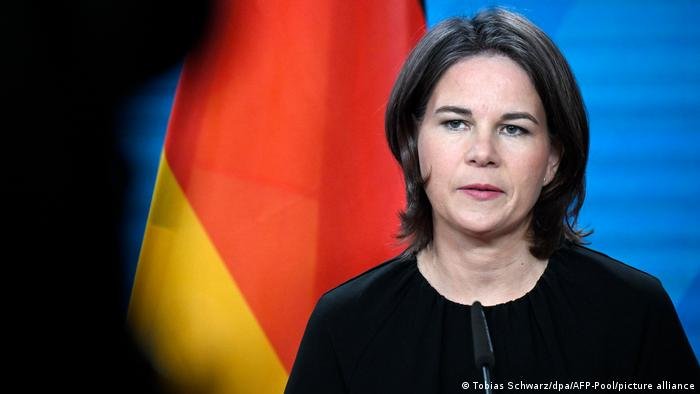
"With forward-looking diplomacy, crisis prevention, reliable and adequately funded humanitarian aid in crisis situations, sustainable development co-operation, reconstruction and fair trading conditions, we are making our contribution to [fighting the causes of] migration and are committed to ensuring that other countries also assume responsibility," the policy paper states.
With this forward vision, the Greens focus largely on the root causes of migration in their manifesto, for example by highlighting that with climate change, "it is the poorest who will suffer the most from the consequences of an escalating climate crisis. The climate crisis is an accelerator of inequality, which we are countering with a socially-just climate policy and our international commitment to climate justice."
Read AlsoUnrealized potential: The challenge of 'brain waste' among Europe's skilled migrants
Differentiating between refugees and economic migrants
In their manifesto, the Greens acknowledge that the reasons why people come to Germany can often vary, and that different sets of people should be treated differently by law.
"Asylum and labor migration must be fundamentally differentiated since they follow different logics," the document states, adding that "labor migration follows the demand for labor, while the admission of people seeking protection follows humanitarian obligations."
"We defend the fundamental right to asylum and stand by our obligations under international law, such as the Geneva Refugee Convention, subsidiary protection and the European Convention on Human Rights."
Whatever the reasons for migrating, in both cases the party stresses the importance of integration at the heart of its immigration policy.
"The strongest drivers of integration are language acquisition, work and employment. Because where people can communicate and create something together, our society grows together," the manifesto reads.
In this context, the Greens also stress that they do not wish to pursue the introduction of any new limitations to existing asylum laws: "We oppose … a course of tightening asylum laws that will only be to the detriment of those seeking protection and hinder integration," they say.
And while other parties are looking at ways to tighten family reunion laws for asylum seekers, the Greens say they wish to make reunions broader and more liberal, stressing again that bringing families together is also an important step in successful integration.
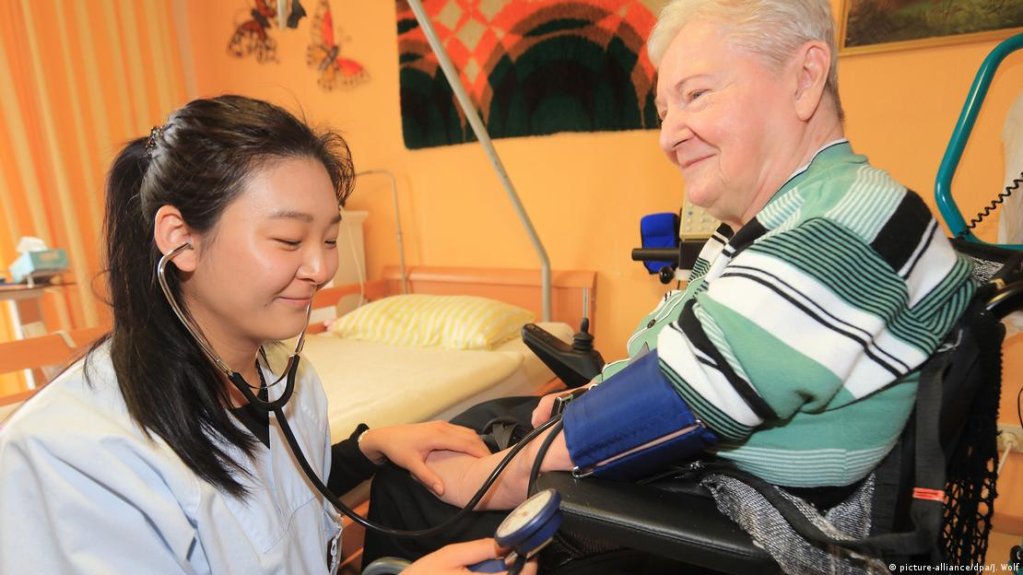
Strengthening legal migration for employment purposes
The manifesto notably focuses chiefly on making the most of available resources to address Germany's shortages in the labor market — such as making part-time work more attractive for stay-at-home parents and allowing people to work for longer (age-wise), if they so wish.
Only about a third of the section on employment opportunities deals with the idea of attracting foreign skilled labor to address these shortages — mainly by lowering bureaucratic hurdles and digitizing immigration procedures.
Here, the document states that "Germany must be attractive, open and welcoming to qualified workers from all over the world."
"We want to significantly simplify the recognition of foreign professional qualifications and, where possible, enable practice-oriented verification options," the manifesto further reads.
Read AlsoWithout immigration, Germany’s labor market would collapse within decades: study
Work opportunities for asylum seekers
The Greens meanwhile also say that they want to enable asylum seekers to enter the work force directly — a view they share with the Social Democrats.
Currently, asylum seekers cannot work while their application is being processed, and if they are approved, their right to work largely depends on the kind of protection they are given.
The Greens wish to change this, and say in their manifesto that "we are continuing to remove barriers to work for refugees, not least because they are integrated into our society more quickly via the labor market."
Further down, the document mentions that the Greens also want government employment agencies "to provide refugees with support in integrating into the labor market at an earlier stage."
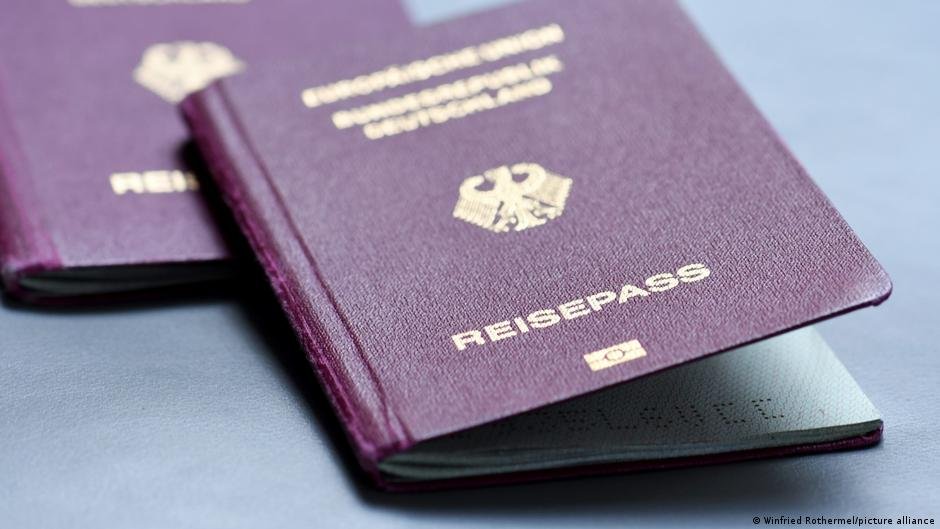
Further advances in citizenship law
As a junior coalition partner in the outgoing administration, the Greens have championed a number of changes in Germany's citizenship laws in the past years, making it easier for people who live in Germany and are fully integrated into society to obtain a German passport.
However, there are limits even to these reforms, on which the Greens say they would like to see further progress.
This, however, is in stark contrast to views expressed by certain other parties, mainly the CDU/CSU as well as the AfD, who wish to dial back on these advances and introduce further curbs to obtaining German citizenship.
This particular issue could prevent the Greens from joining a coalition with anyone who opposes their liberal policy.
Read AlsoGerman opposition calls for reversal of citizenship reform
Voluntary returns over deportations
"Not everyone who comes to Germany can stay," the manifesto states, adding that those who have no "right of residence after an individual examination of asylum and residence requirements and after exhausting all legal remedies … must leave the country quickly."
However, the Greens also stress that voluntary return programs are their preferred mode of seeing such cases through.

"It is clear to us that people must not be deported to countries where there are human rights or international law reasons to the contrary. Deportations to war and crisis zones are prohibited," they further emphasize in the policy paper, while adding that this does not apply to "deportees who have committed serious crimes," who they say need to be deported as a matter of urgency.
Read AlsoGermany's migrants 'deserve more respect' says German minister
A unified European migration policy
The Greens' manifesto also states that Europe's goals in immigration policies can only be reached together. The party advocates a common European migration policy "with a fair, binding and solidarity-based distribution of people seeking protection in Europe," in line with the EU pact on migration, which is being rolled out across the bloc over the course of 2025 and into 2026.
Making reference to EU member states which have shown reluctance on joining a common migration policy, the Greens say that they are willing to work together with them and that they "will do everything in our power to ensure that integration is promoted, that constitutional procedures are guaranteed as comprehensively as possible and that there are no additional, unnecessary restrictions on the right to asylum."
The party furthermore states that it wants to improve the rule of law when it comes to monitoring the external borders of the EU, saying that it categorically rejects pushbacks and wants to see those who engage in the illegal practice prosecuted.

The manifesto also calls for more oversight regarding Frontex' function, the EU's external border agency, which has in several instances come under fire over allegations of facilitating or even participating in pushbacks at the borders.
The Greens say they also reject the idea of outsourcing asylum procedures to third countries, and stress that each asylum application anywhere in the EU must be processed on its own merit, rejecting blanket judgments on "safe countries of origin" or other prescriptive conditions that might need to be met to qualify for protection.
Security — chiefly a prevention issue
The Greens say they want to shift the focus on preventing crime by extremists to enacting laws which may disincentivize people to come to Germany to engage in criminal acts in the first place.
In order to fight Islamist violence, they demand more early prevention programs, which "prevent people from becoming radicalized" and "which educate people about both right-wing extremism and Islamism in the analog and digital space."
Furthermore, the Greens also want to make weapons even more inaccessible to people who might pose a threat to society, calling for greater weapons' controls while highlighting that the number of both legal and illegal firearms in Germany has risen in recent years.
The party also says that it wants to combat trafficking and modern-day slavery as part of the discourse on migration, saying it would seek to strengthen police powers to this end, and enact harsher punishments on those who perpetrate such acts, often linked to organized crime, in Germany.
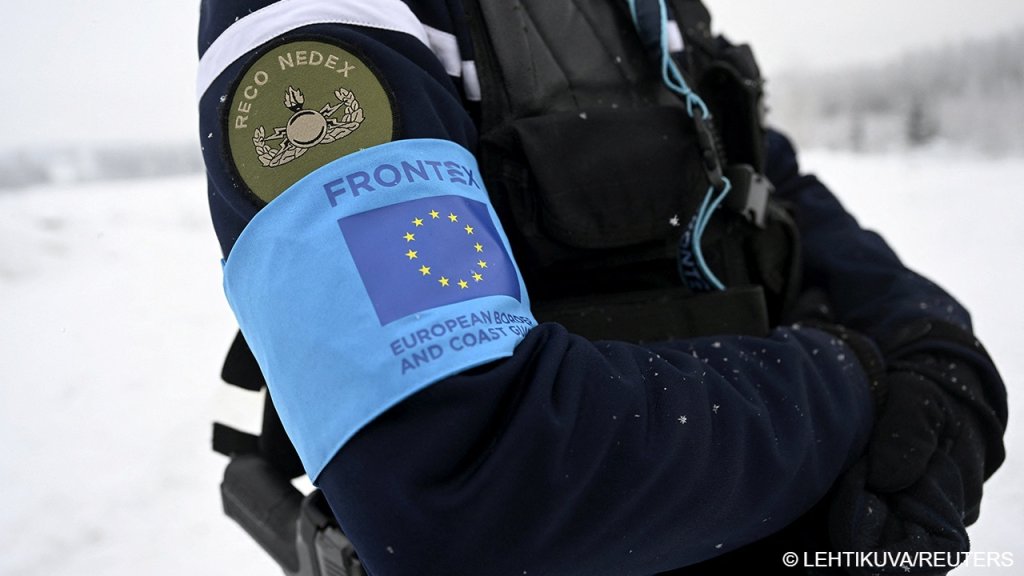
The fight against terrorism
The Greens acknowledge that "Germany has been shaken by many terrible acts of right-wing extremist and Islamist terrorism in recent years," stressing that in their view, authorities need to be given more powers to counteract these trends.
"We will set up [further capacities in] the Federal Office for the Protection of the Constitution (BfV) in counterintelligence, and the Federal Intelligence Service (BND) in foreign reconnaissance so that they can better protect democracy from attacks than before," the manifesto says.
"[People who pose] high-level threats must always be in the crosshairs of the security authorities across all [EU] countries, and must be monitored non-stop and — wherever possible — be subject to legal prosecution," they add.
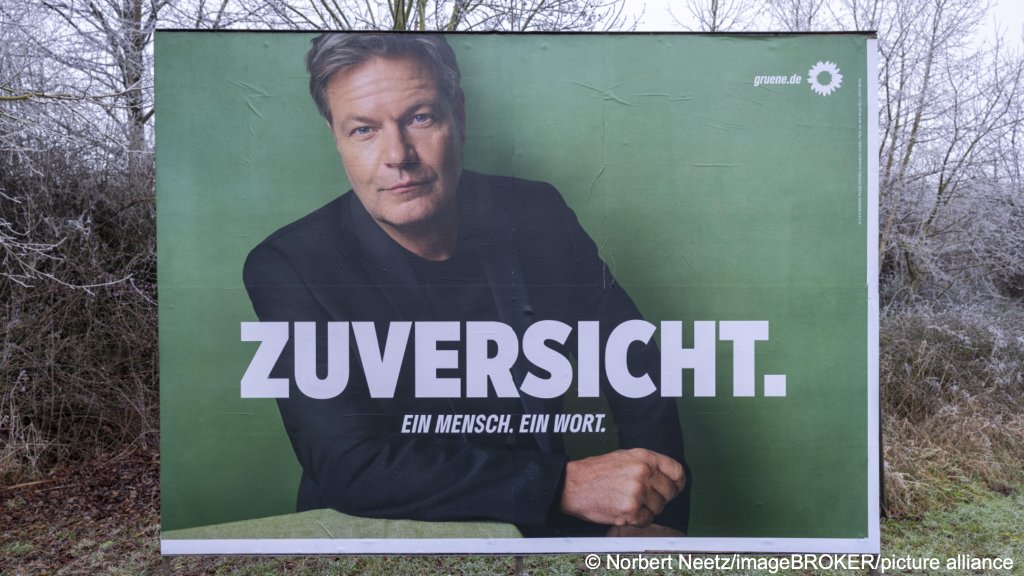
The question of Syria's future
"The Assad regime is responsible for decades of oppression, torture, murder and displacement," the Greens' manifesto states in its chapter on Syria, underscoring the fact that after the recent change in regime, Syria is only at the beginning of its transformation process.
"Many Syrians are now hoping for a life in peace and freedom. We support them on this path, within the framework of the EU and the UN: for a peaceful and democratic transformation process that involves all Syrians, regardless of their faith, ethnicity or gender," the document elaborates.
The Greens further identify that Germany's dedication to peace in the region "includes continuing to provide humanitarian aid, promoting reconstruction and dismantling existing EU economic sanctions in order to support a new beginning in Syria and sustainable stability in the region."

At the same time, they say they seek a more liberal approach in the way that Syrians who have come to Germany over the past decade as refugees should be treated, giving assurances to Syrians who may feel uncertain about the long-term effect of these recent events:
"We offer the people who have found refuge with us in recent years a reliable perspective. Many of them want to play an active role in this reconstruction. We are supporting them by reducing the bureaucratic requirements that have stood in their way so far, without them losing their residence permit in the current volatile situation," the manifesto states.
"It is still completely unclear in which direction Syria will develop. In this unclear situation, we consider the hasty demands for repatriation to be wrong," the Greens add, stressing that they won't seek a change to the status quo of existing refugees.
Read AlsoGermany's plan for Syrian refugees: Will protection status be revoked?
You can read the Greens' manifesto in German in full here, where there are also short synopsis available in other languages.
